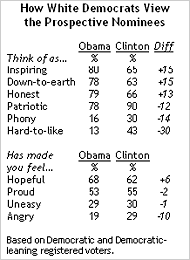by Andrew Kohut, President, Pew Research Center Special to the New York Times
At the start of his run for the presidency, Barack Obama would explain the positive reaction he was getting from admirers by saying “this is more about you than about me.” Now that Obama is the front-running Democratic candidate, an in-depth look at how voters are reacting to him — and the reasons for those reactions — lends considerable credence to his characterization of public opinion. It turns out, however, that the “it’s about you” phenomenon is a little broader than Obama might have imagined. It pertains not only to reasons for liking and supporting him, but is also relevant to reasons for disliking him and for supporting Hillary Clinton.

This is what the Pew Research Center1 learned in a poll conducted in late March. The analysis of the poll focused on white Democrats, as they have been the swing voters in the nomination contests. A series of questions asked respondents about the personal qualities — both positive and negative — they associated with each candidate, special sources of unease and the general feelings that the two candidates stirred in them.
Overall the polling found that Obama has a glowing image. Huge majorities see him as honest, inspiring and down to earth, and only very small percentages express negative opinions of him.
Personal views of Clinton among white Democrats are quite different. Many fewer Democrats say she is inspiring, honest and down to earth and many associated negative qualities with her — 3 in 10 say they view her as “phony,” while 4 in 10 say she is “hard to like.”
While Obama’s positive personal image plays an important role in his high favorable ratings, the polling found that his ratings are more influenced by how he makes voters feel than by specific characteristics they attributed to him. In particular, views that Obama inspires hope and pride are the strongest determinants of a person’s opinion of him. In other words, he is a charismatic candidate who has made large numbers of Democratic voters feel good, and this is even more important to them than specific perceptions of him.
In contrast, Clinton’s image is more driven by opinions about her own qualities, rather than the emotions she engenders in others. Although, making voters feel hopeful does register as a significant factor for her, especially among women, it is much less important than for Obama. Honesty is as much a factor for her as for him, though many fewer see her as honest compared to her opponent.
Read the full commentary at nytimes.com
Notes
1 Pew Research Center for the People & the Press, “Obama Weathers the Wright Storm, Clinton Faces Credibility Problem,” March 27, 2008.




